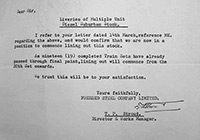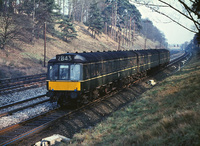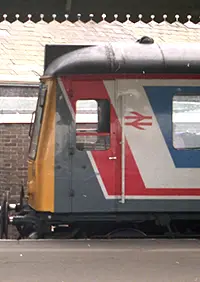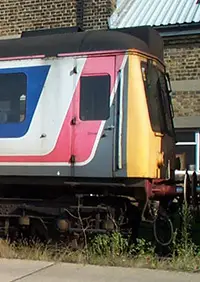Class 117 Pressed Steel 3-car DMUs
Liveries
Green with whiskers, no lining

They were delivered in Loco Green (the darker shade commonly called Brunswick). The standard practice at the time was that suburban stock was not lined. All had white roof domes and whiskers, and at least the first set had some of the underframe equipment picked out in silver. Writing could often be seen on the buffer beams to the left of the coupling hook, this referred to them being fitted with with ATC gear. The works image shows 51374 on 10/12/59.
Green with whiskers, lined

After protest from the Western Region General Manager over their bland appearance, sets began to be delivered from the manufacturers lined. The correspondence shown from Pressed Steel (dated 5th April 1960) suggests this happened from the 20th set onwards.

Yet pictured is lined W51343 when just six months old when seen in Reading depot, 24th October 1960 (Adrian Vaughan). As W51343 was in the 12th set, and the 4th set that would be delivered in April 1960, (i.e. four sets after the letter was written) it seems possible that 19 vehicles not sets had been completed by then. It seems unlikely that W51343 would have been lined after delivery as unlined sets were still to be seen in 1962.
All were eventually lined as they passed through shops.
Sanding down 51382 for repainting at the Midland Railway Centre in 2003, the original lining was exposed, and this measured: top - 1" wide, 5" from lower gutter edge; bottom - cream 1 1/2" with 1/16th black edges, 6 1/4" from lower window rubber.
Green with yellow panel

Yellow panels began to replace whiskers in 1963.
The image shows a set at St Johns (between Woking and Brookwood) on 14 February 1967. George Woods.
Rail Blue with yellow panel

In 1967 some sets received the short-lived all-blue livery variation of a small yellow panel, white cab dome and red buffer beam, umber underframe, small (3") numbering and the new BR logo on the cab doors.
The image is not of great quality but the only one on this website in these colours. Taken near Paddington on 9-3-67. David Faircloth.
For other samples see these examples on flickr or RCTS websites.
Rail Blue with full yellow end

What became the standard Rail Blue livery application would have full yellow ends, the cab dome the same colour as the roof, black buffer beams/underframe, and 4" numbers.
The image shows set 421 running as a 4-car set with Class 101 trailer W59528 at Wylye on 12th April 1971 (David Mant).
The next subtle change was the loss of the 4-character indicator, being replaced with two white dots.
Refurbished

Refurbishment saw the white / blue stripe refurbished livery appearing from 1977, as featured on 51397 / 59507 / 51355 at Windsor Central on the 15th June 1980 (Robert Frise).
Blue / Grey

In June 1979 they started appearing in blue/grey livery, and the sample photo shows set T302 (cars 51360 / 59512 / 51402) entering Birmingham Moor Street on 23/10/87 (Mac Winfield). London sets in the Network South East era could be seen carrying NSE stickers while in BG livery, these would be under the center cab window or on the side of the center car.
GWR

A one-off livery appeared for the GWR 150th anniversary celebrations in 1985 when 51368 / 59520 / 51410 were painted into Chocolate & Cream. They worked in these colours as T305, B430 and 117 305. It's seen in the image as T305, working "The Birchfield Rambler" at Quainton Road on the 2nd May 1988 Robert Frise.
Network South East

NSE livery appeared in 1986, the yellow end no longer reached the edge of the cab door as it did in Blue Grey livery.
The image shows set L413 at Reading on 24 February 1988 (Hamish Stevenson).


Where the lining swept down at the cab sides this was initially an angled change to horizontal — later, (circa early 1990?) this was altered to a curve.
The first close up shows the angled type (51366 at Reading on 29/6/87, Malcolm Clements), the second shows the curved version. In the second image also note the lack of BR logo, this would begin to be dropped around early 1990 but did appear on the curved version.
The gap cut into the gutter (2nd image) allowed the water to drain (away from doors/windows).
Regional Railways

The final livery for passenger vehicles was the facelifted sets for Birmingham Cross-City services appearing in Regional Railways colours.
Set 117 314 is seen at the Doncaster Works open day, 12/7/92. Kevin Dowd.
Regional Railways with Scotrail branding

The facelifted sets that were transferred from Birmingham to Scotland would receive ScotRail markings in place of the Regional Railways ones.
The images shows two of these on Haymarket Depot on 10th February, 1999. Michael Laing.
Summary
Orders
Description
Gangways
Diagrams
Works Photographs
Numbering & Driving Inst.
Set Numbers
Liveries
Operations
Refurbishment
Non-Passenger Use
Images
Details about preserved Class 117s can be found here.


